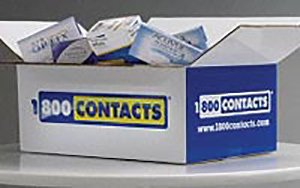 The
Federal Trade Commission recently alleged that contact lens retailer 1-800Contacts violated antitrust laws and engaged in an unfair business practice by preventing rivals from using its trademarks in
search ads.
The
Federal Trade Commission recently alleged that contact lens retailer 1-800Contacts violated antitrust laws and engaged in an unfair business practice by preventing rivals from using its trademarks in
search ads.
Now the company is also facing two class-action complaints by consumers who say they overpaid for contact lenses due to 1-800Contacts' alleged anti-competitive practices.
The retailer allegedly engaged in an "overarching scheme to restrain competition in the direct-to-consumer and online markets for contact lenses," California residents J Thompson and William
Duncanson say in a complaint filed last week in U.S. District Court for the Southern District of California. A separate class-action complaint, filed last month, is pending in the Northern District of
California.
advertisement
advertisement
The lawsuits by consumers draw heavily on the FTC's allegations, unveiled in August. The FTC contends that between 2004 and 2013, 1-800Contacts
sued or threatened to sue 15 competitors for allegedly purchasing the term 1-800Contacts as a trigger for pay-per-click search ads. 1-800Contacts argued in those matters that this use of its name
amounted to trademark infringement. Only Lens.com fought the case, which ended in a ruling largely in Lens.com's favor.
The other 14 retailers agreed to restrict
their use of the term 1-800Contacts in search ads, according to the FTC. Those agreements also require the other retailers to use "negative" keywords -- which direct search engines not to display ads
in response to queries with the term 1-800Contacts, according to the FTC. The agency alleged that the agreements distorted prices in search-ad auctions, and also resulted in higher prices for some
consumers.
Duncanson and Thompson say in their complaint that they "paid supracompetitive prices" for contacts.
"Because of the unlawful agreements, competitors could not advertise
against 1-800 Contacts, and therefore customers did not receive information concerning competitors’ products and pricing," they assert. "Because of these agreements, 1-800 Contacts continued to
give the impression that it was a low-cost provider of contact lenses, shielding the public from information that would have driven the price of contact lenses down."
Duncanson and Thompson
also are suing some of 1-800Contacts' competitors, including Vision Direct, which allegedly entered into an agreement with 1-800Contacts.
"In a competitive marketplace, VisionDirect would have
continued to compete, in both advertising and on price," the complaint alleges. "It could have covered its prices and increased its market share, taking from 1-800 Contacts."
1-800Contacts'
general counsel Cindy Williams says the class action suits "have no merit whatsoever."
Williams adds that the company "strongly disagrees" with claims that the trademark settlement
agreements are anticompetitive. "We reject any assertion that competitors should be allowed to violate our trademark rights through paid search, and we look forward to the opportunity in
court to present our position fully," Williams says in a statement emailed to MediaPost.
Courts haven't definitively resolved questions surrounding the use of trademarks in search ads. Google
and Yahoo have prevailed in several lawsuits alleging that they wrongly allowed a trademarked term to trigger pay-per-click ads, as have several advertisers. But judges have let some lawsuits between advertisers
proceed to jury trials.